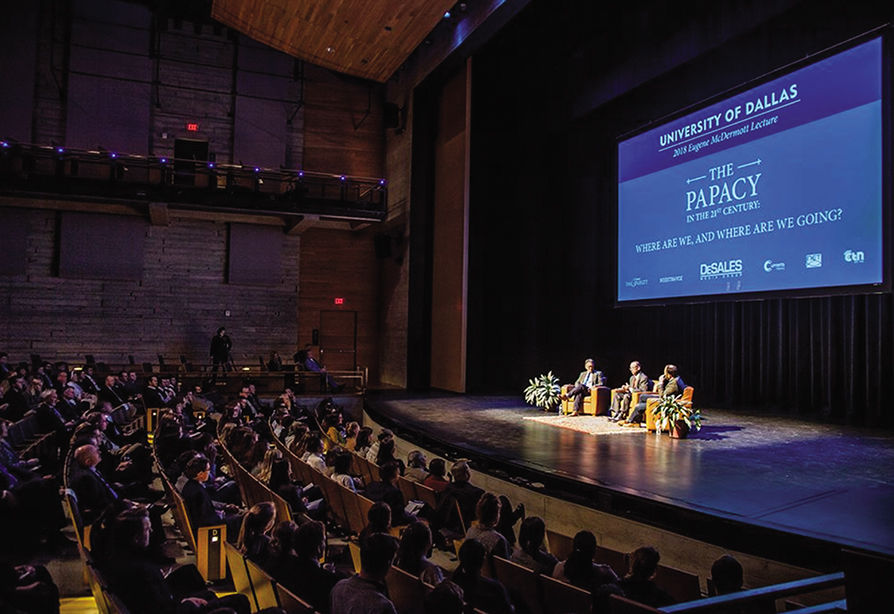DALLAS, Texas — It’s the nature of my gig that I go to a lot of events: conferences, panels, symposia, plenary assemblies; you name it, I’ve been there.
Often you learn something, other times you make a new contact, but few of those outings truly qualify as memorable.
Jan. 24 in Dallas was the exception that proved the rule.
That night, I moderated a remarkable event hosted by the University of Dallas featuring two of the smartest, best-informed and most articulate Catholic commentators alive — Ross Douthat of The New York Times and author of the forthcoming “To Change the Church: Pope Francis and the Future of Catholicism,” and Austen Ivereigh, author of “The Great Reformer: Francis and the Making of a Radical Pope” and a Crux magazine contributor.
Anyone who knows the lay of the land in English-speaking Catholicism today will immediately recognize Ivereigh as a leading supporter of Pope Francis, and Douthat as perhaps his most trenchant critic. As a result, the forecast Wednesday was for fireworks, and indeed there was plenty of lively disagreement, captured in a superb write-up by Crux’s national correspondent, Chris White.
As with so many things in life, however, it’s often easy to get the details of something right but miss the bigger picture, so I thought I’d try here to capture a bit of that context.
First of all, the big show Wednesday night was not the only time Douthat and Ivereigh were together at the University of Dallas. We were all around most of the day Wednesday, taking part in various smaller-scale events and spending time with students and faculty.
After we shared the stage that night, we went back to our hotel and, joined by White, spent until the wee hours of the morning talking about pretty much everything under the sun, fueled by late-arriving Domino’s pizza and a timely bottle of bourbon supplied by a kind soul, after I made a point (repeatedly) of lamenting that our hotel had no bar. (Douthat, alas, didn’t join us for the bourbon for medical reasons, but, as I told him, he was nonetheless able to experience “spiritual communion.”)
What was obvious all day was how much these guys genuinely like each other, respect each other and want to learn from each other. In other words, underneath the very real disagreement is an equally real friendship, which informs everything they say and do.
Second, while there were multiple points at which Ivereigh and Douthat parted company on Wednesday night, there were also multiple areas where they’re in sync, seeing the same realities and diagnosing them more or less the same way.
For instance, Ivereigh began by laying out his standard assessment of what the election of Cardinal Jorge Mario Bergoglio in March 2013 meant, saying it was a badly needed shock to a Church that had become sclerotic, focused excessively on itself, and so rule-obsessed that the world only knew what Catholicism was against rather than what it’s for.
Moreover, Ivereigh said, March 2013 also marked the date when Catholicism truly went “global,” capable of having something other than just the “rich church” conversations that characterize Europe and North America.
Douthat basically agreed with most of that, and said that at his best, it’s still what Pope Francis delivers. He insisted, however, that’s not all the pope has done, arguing that he’s also unleashed severe theological tensions in Catholicism that may only be able to be resolved in a future ecumenical council, and which could lead to some sort of schism on the other side.
Further, when I asked them a governance rather than a doctrine question — to wit, what do they make of Pope Francis’ handling of the clerical sexual abuse scandals — they gave two versions of basically the same answer, which was great promise early on and important steps forward, but also serious question marks suggestive of unfinished business.
In other words, they proved that apparent foes often actually have a great deal in common.
Finally, there was one other point that was just slam-dunk, in-your-face clear throughout not only Wednesday night, but every conversation we shared: Both Ivereigh and Douthat begin from a deep love of the Church, and a profound desire to help the Church realize the best version of itself. Obviously, they differ to some extent on how to do that, but the starting point is identical.
C.S. Lewis once wrote, “What draws people to be friends is that they see the same truth,” and that’s Douthat and Ivereigh — they both see the truth that the Catholic Church is precious, that it matters deeply whether the Church is healthy and moving in the right direction, and therefore it’s worth their last, best effort to try to make that happen.
I told people after the big showdown that had I been scoring it like a heavyweight prizefight, I’d declare a draw. I thought both were at their best, both landed some strong blows and neither was ever on the ropes.
The real point, however, is that this wasn’t a prizefight; it was a conversation between friends who happen to disagree on some very important issues but who are motivated by the same deep desires.
As I was standing at a reception afterward in the atrium outside the hall, a couple approached me still aglow from what they had seen. (They told me they had come on their date night, leading me to certify them as a new high on the “nerd meter.”) They said they wished they had brought their kids, because this was such a great example of how, in the words of University of Dallas President Tom Keefe, you can “disagree without being disagreeable.”
Amen to that, and here’s hoping this isn’t the last time we get to see it.
Interested in more? Subscribe to Angelus News to get daily articles sent to your inbox.

